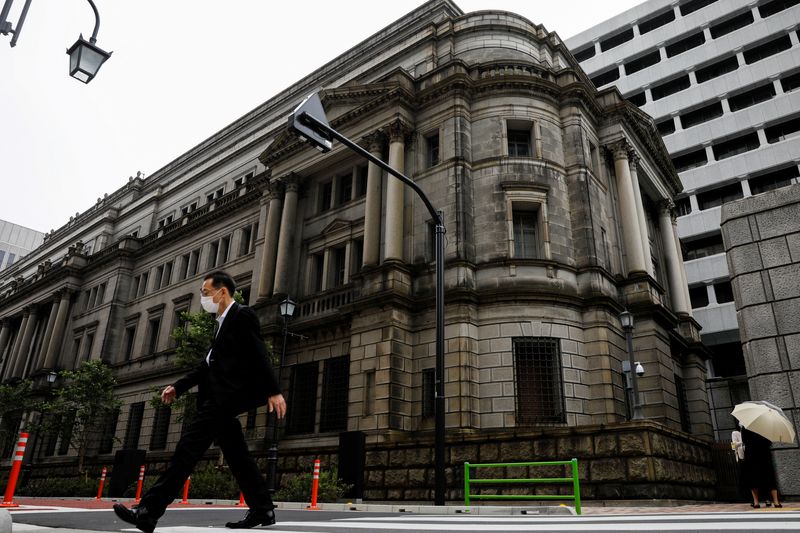By Leika Kihara
TOKYO (Reuters) - A rapid decline in the yen and market distortions caused by current monetary settings have raised the political heat on the Bank of Japan as it becomes increasingly isolated in a world of hawkish-leaning central banks.
Opposition lawmakers are grilling the BOJ regularly for allowing the currency to weaken and push up living costs, putting Prime Minister Fumio Kishida in a hot spot ahead of an upper house election scheduled in July.
While Kishida has defended the BOJ's policy as necessary for supporting a persistently weak economy, the fresh scrutiny on the bank could colour the government's deliberations about who will succeed its dovish governor, Haruhiko Kuroda.
As the weak yen and global shift toward tighter monetary policy begin to reshape Japan's policy debate, the feasibility of maintaining ultra-low interest rates may feature high in the selection process of the central bank's next leader.
"The BOJ has been keeping rates zero since 1990. Rising raw material costs have come on top of this. It's time the BOJ alter its weak-yen policy," opposition lawmaker Akio Fukuda told deputy governor Masayoshi Amamiya - seen as a strong candidate to succeed Kuroda - in parliament on Tuesday.
While the selection of governor is typically a closely watched affair, current economic challenges and a heightened focus on the BOJ's unconventional monetary policy mean there is now more even attention than usual.
Former BOJ deputy governor Hiroshi Nakaso, also seen as a front-runner to become next governor, weighed in by describing former premier Shinzo Abe's "Abenomics" policies as having been overly reliant on radical monetary stimulus.
Although a rate hike won't come any time soon, the shift in public mood puts the BOJ under pressure to have a plan ready for in case it needs to tweak its yield cap.
"People will get more frustrated with rising prices if yen declines persist. There's also feasibility questions around the BOJ buying too many bonds," said Nobuyasu Atago, a former BOJ official who is now chief economist at Ichiyoshi Securities.
"There's a chance the BOJ could fine-tune yield curve control later this year, if the yen falls too much."
COMMUNICATION CHALLENGES
The yen has slumped to two-decade lows on prospects of aggressive U.S. rate hikes, which contrast with the BOJ's resolve to keep short-term rates at -0.1% and the 10-year yield around 0% under its yield curve control (YCC) policy.
Kuroda has justified keeping low rates by stressing how Japan's inflation, which is seen hitting his 2% target this year, remains much lower than that of Western nations.
But the difficulty in advocating low rates may heighten on signs the European Central Bank, long a fellow dove among global central banks, will end negative rates this year.
The public is feeling the pinch. The proportion of households expecting prices to rise a year from now has hit a 14-year high, with more of them saying they felt worse off than three months ago, a BOJ survey showed last month.
More than 60% of Japanese companies want the BOJ to end its ultra-easy policy this fiscal year due to pain from the weak yen, according to a Reuters survey.
The BOJ's strengthened efforts to defend its 10-year rate cap have also drawn fire from investors for distorting the yield curve and rolling back years of work to breathe life back into a market made dormant by its huge presence.
The gap between public concerns over the weak yen and the BOJ's insistence on keeping ultra-easy policy, could hurt the bank's credibility and heighten the challenge of communicating its policy intentions, some analysts say.
"There's a growing public perception the BOJ is to blame for the weak yen and households' rising burden," said Naomi Muguruma, senior market economist at Mitsubishi UFJ (NYSE:MUFG) Morgan Stanley (NYSE:MS) Securities.
"Monetary policy won't work well if what the BOJ is saying does not resonate with markets and the public."
